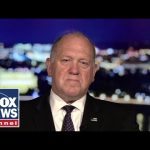In a tale that sounds more like a scene from a political satire than real life, a comedian recently found himself in quite a pickle at Heathrow Airport. This comedian, 57 years old and fresh off a flight from sunny Arizona, was apprehended by five armed officers over posts he made on social media regarding transgender issues. The individual’s arrest has sparked discussions about freedom of speech in the United Kingdom, revealing the growing unease over public discourse in our modern age.
The comedian’s posts, shared on a platform known as X, allegedly incited violence, at least according to police statements. When officers took him into custody, they quickly became concerned for his well-being, leading to a trip to the hospital due to stress. Meanwhile, the comedian took to social media to express his discontent with the situation, proclaiming he had been treated like a criminal, all because of some jokes that had apparently ruffled the feathers of “psychotic cross-dressers.” Ah, how the tide of humor can turn into a whirlpool of trouble!
This incident has drawn considerable attention from high-profile commentators, including Piers Morgan, who declared the absurdity of the situation. Outraged, he highlighted how being arrested for such tweets bears a striking resemblance to the oppressive atmosphere found in North Korea, where free speech is restricted. Morgan’s statement resonated with many who share concerns over the gradual erosion of fundamental rights, particularly in a nation that prides itself on democratic values.
The implications of this case stretch beyond one comedian’s joke. It raises significant questions about the state of free speech not only in the U.K. but worldwide. If people cannot openly remind us of biological realities without fear of backlash, can they genuinely be labeled as free? The idea that one must tiptoe around truths—such as that only a man and a woman can biologically create a baby—seems to be at odds with the very concept of liberty itself. For those who believe in the principle of free expression, this situation serves as a wake-up call. When free speech begins to wane, what does that mean for everyone else?
Discussions around this arrest echo sentiments from both sides of the pond, with many libertarian advocates warning of similar trends in the United States. As social media platforms tighten their regulations to accommodate various narratives, it often makes expressing dissenting views more challenging. In a time when social media is an integral part of communication, gagging individuals for expressing their opinions can lead to a slippery slope that affects discourse across all platforms.
As the situation unfolds, all eyes will be on the Westminster courtroom where the comedian is set to appear, accused of harassing a transgender individual. He has denied these allegations, and it remains to be seen how the case develops. Regardless of the outcome, this incident has undoubtedly ignited a firestorm of debate about the freedom of expression in contemporary society. The question lingers in the air: how far are we willing to go to protect our right to speak freely? With events like these, the urge to clench our fists over our free speech rights must not go unnoticed—after all, laughter has always been a powerful tool for critique, and it deserves a voice in every democracy.




